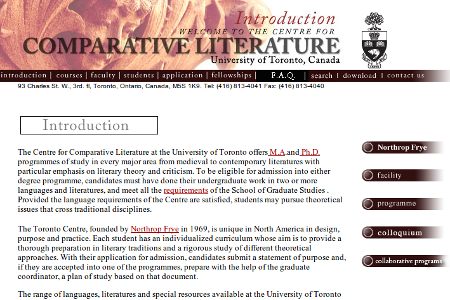
So far the Centre for Comparative Literature at the University of Toronto has 12 votes of non-confidence and over 5.000 votes of confidence. The 12 votes are those of the Strategic Planning Committee; the rest are from a much wider public which includes everyone from steelworkers to ministers to concerned citizens and, of course, academics. Meric Gertler, the Dean of Arts and Sciences surely must realize that both his office and the Strategic Planning Committee are losing the confidence of the public and scholars alike.
If the number of signatures on the petition is not enough to convince some, they can now also turn to http://savecomplit.blogspot.com/ . This webpage includes letters sent to the President, to the Dean, to the Globe and Mail, and many others. Reader responses to the letters can be posted in the comment section.
Victor Li, co-editor of the University of Toronto Quarterly and Associate Professor of English and Comparative Literature, writes: “As any knowledgeable scholar in the field will attest, comparative literature has not become redundant because literary theory and the comparative approach have been absorbed by other disciplines in the humanities. In fact, as the abundance of published books and lively debates in cutting-edge humanities journals clearly indicate, comparative literature remains a highly important and relevant area of academic enquiry in this age of globalization and cultural diversity.”
David Damrosch, chair of the Department of Comparative Literature at Harvard, past Northrop Frye Professor of Literary Theory, and past President of the American Comparative Literature Association, writes: “As with individual departments, so at the national level: the membership of the American Comparative Literature Association (ACLA) has grown steadily throughout the past dozen years, and our annual meeting has seen a tenfold increase in papers delivered, averaging two thousand per year in the past two years. Our participants have come from all around the US and Canada, and from nearly fifty other countries as well, in a reflection of the discipline’s expanding role as a central venue for thinking about cultural processes and interactions in a globalizing world. Speaking as a past president of the ACLA, I feel a sharpened sense of concern at the proposed disestablishment at Toronto when our Association is planning its next annual meeting in Vancouver (our second time in Canada in recent years), where we’ll be hosted by the rapidly growing new program in World Literature at Simon Fraser University, founded just a few years ago by a group of faculty led by Paulo Horta, a Toronto graduate.”
For more letters, please visit the webpage. If you have written a letter to the Dean, Provost, President, Globe and Mail, etc., and would like to see your letter included on this webpage, please forward it to: savecomplit@gmail.com and we will post it in the near future.

